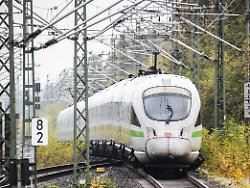Friday 5th November 2021
Sale of donors
Breaking up could rehabilitate the railway
Punctual trains, better service, more sales: Greens and FDP will sense these opportunities if Deutsche Bahn sells its subsidiaries and surrenders its network. What is certain is that there will be new staff at the top of the group.
In the course of the coalition negotiations, the debate about reorganizing Deutsche Bahn is gaining momentum again. The Green finance expert Sven Giegold suggested selling the subsidiaries active abroad. “I wonder whether the railway has to continue to deal with goods traffic all over the world. Or whether it would rather expand rail traffic inland and to neighboring countries,” he told the “Rheinische Post”. Giegold sits in the European Parliament and is part of the finance working group in the traffic light negotiations. The Greens and the FDP have long been calling for the sale of subsidiaries and, above all, for the rail network to be separated from the group.
According to “Spiegel”, the traffic light coalitions discussed the future of the heavily indebted railway on Tuesday. The state-owned company is expected to double the number of passengers by 2030. Two models were discussed in the coalition negotiations. In the “extreme” model, the infrastructure sector would be split off into a public society oriented towards the common good. Regional, long-distance and freight traffic remained. The “moderate” model therefore provides for a holding company under whose roof network and train operations would be organized. Formally, the unity of the group would be preserved.
Monopoly Commission for the Separation of Network and Operation
Rail competitors and the Federal Monopoly Commission also advocate an independent network. The founder and boss of DB competitor Flixtrain, André Schwämmlein, told the “Spiegel” that in countries that had successfully brought competition to the rails, infrastructure and operations were separated. Therefore, Germany must also disentangle the state-owned company. An independent network operator would have an economic interest in bringing more competition and more traffic to the railways. Schwämmlein promised more investments in the event of a break-up.
The SPD rejects a split, however. The highly indebted railway had already tried to sell the international local transport subsidiary Arriva. However, this failed, among other things, due to the Corona crisis. The focus is also on the international forwarding subsidiary Schenker. It was most recently the most important profit supplier for the state company. According to expert estimates, a sale could bring in proceeds of more than ten billion euros.
It is certain that the high-ranking personnel of the railway will be rebuilt under a traffic light coalition. There are still several Union politicians on the supervisory board, and the head of the committee, Michael Odenwald, is also part of this camp. Former Chancellor Ronald Pofalla heads the important infrastructure division and, like railway chief Richard Lutz, has to fear for his position. Traditionally, filling the head of the Deutsche Bahn is a matter for the Chancellery.
SPD should take part in the reform debate
Sigrid Nikutta, head of the rail freight operator, can count on the support of the SPD on the rail board. The Social Democrats and the largest rail union EVG, however, strictly reject a split of the group and a separation of the rail network. The DB competitors appealed to the SPD to take part in a reform debate: “The refusal of the discussion by the social democrats only ensures that the unsatisfactory status quo is maintained – progress is different,” said Peter Westenberger, managing director of the European Railways Network (NEE). “Persistently miserable quality for all of the company’s customers, increasing indebtedness and repeatedly failed economic goals speak clearly in favor of examining and curing the patient DB.”
The Monopolies Commission, as an advisory body to the government, demanded more commitment to competition from a future coalition. The separation of the network will serve this purpose: “The new federal government should tackle the vertical separation of Deutsche Bahn AG, that is, a separation of the infrastructure from the actual railway operations,” said chairman Jürgen Kühling of the “Süddeutsche Zeitung”.
